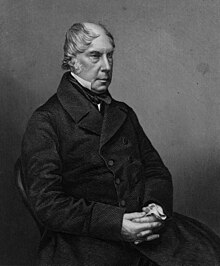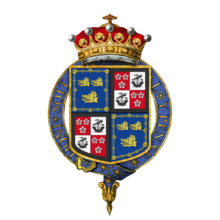George Hamilton-Gordon, 4th Earl of Aberdeen
George Hamilton-Gordon, 4th Earl of Aberdeen KG , KT , PC (born January 28, 1784 in Edinburgh , † December 14, 1860 in London ) was a British statesman and Prime Minister from 1852 to 1855 . He led his country into the Crimean War .
Life
He was born George Gordon and was the eldest son of George Gordon, Lord Haddo (1764-1791), and his wife Charlotte Baird († 1795). His father was the eldest son and heir to George Gordon, 3rd Earl of Aberdeen (1722-1801). George Hamilton-Gordon lost his parents at a young age. At the death of his father in 1791, he became apparent to his grandfather and from then on carried the courtesy title of Lord Haddo . With the death of his grandfather in 1801 he inherited his title of nobility as 4th Earl of Aberdeen .
He was on the traditional private school Harrow , where Lord Palmerston , Robert Peel and Lord Byron , and later were his fellow-student at St. John's College of Cambridge University trained. After completing his studies, he accompanied Lord Cornwallis in 1801 as embassy attaché to Paris for the negotiations on the peace of Amiens . After earning his master's degree at Cambridge in 1804, Lord Aberdeen toured Greece, and on his return home founded the Athenian Society, engaged in classical studies and published studies on the topography of Troy and the principles of beauty in Greek architecture.
1806 Lord Aberdeen was elected Scottish Representative Peer and joined the Tories in the House of Lords ; but he did not appear as a speaker until 1810 when he requested the reply address to the Prince-Regent's speech from the throne. As early as 1808 he was made Knight Companion of the Thistle Order.
In 1813 he was sent to Vienna as a special ambassador in order to conclude an alliance treaty between Great Britain and Austria against Napoleon in Teplitz after the formation of the Austro-Russian-Prussian coalition . As an observer, he experienced the battles at Großgörschen and Bautzen and, together with Wilhelm von Humboldt, the Leipzig Battle of the Nations .
In Naples in 1814, Lord Aberdeen helped Murat to switch sides and to oppose Napoleon. Lord Aberdeen was one of the signatories to the treaty that restored Bourbon rule over France on June 1, 1814 . In recognition of his services, he was admitted to the Privy Council on July 22, 1814 and on July 16, 1814 the title Viscount Gordon , of Aberdeen in the County of Aberdeen, bestowed on him. This title of nobility belongs to the Peerage of the United Kingdom and, in contrast to its Scottish titles, was associated with a hereditary seat in the House of Lords. In the House of Lords he regularly voted with the Tories and spoke out against both the abolition of grain tariffs and the emancipation of Catholics and against the recognition of the South American republics and the foreign policy of Prime Minister George Canning .
After he died in 1818 on the death of his father-in-law John Hamilton, 1st Marquess of Abercorn , whose general heir, he added his family name to "Hamilton-Gordon" with a Royal License from November 13, 1818 and took the latter's coat of arms into his.
In 1828 Lord Aberdeen entered a British government for the first time as Chancellor of the Duchy of Lancaster . He was then twice foreign minister, once under the Duke of Wellington from 1828 to 1830, then under Sir Robert Peel (1841 to 1846). During this time the war with China ended, the Entente Cordiale formed with France and relations with the United States were expanded. Unlike in his previous political work, he spoke out in this position for Catholic emancipation and firmly adhered to the principle of unconditional non-interference in foreign affairs, especially after the July Revolution in France. In 1830 he was involved in the negotiations for the establishment of the Kingdom of Belgium , but resigned with the Wellington Cabinet before their termination in November 1830. Under the Peel government, Lord Aberdeen was first Minister of War and Colonial Affairs from 1834, and then Minister of Foreign Affairs from 1841 . During this time he took significantly more liberal positions than before. After the repeal of the grain customs laws in 1846, he resigned.
Lord Palmerston's foreign policy opposed Lord Aberdeen, but did not rejoin the Conservatives and also refused a seat in government offered to him by Lord Derby in February 1852.
In 1852, Lord Aberdeen succeeded the resigned Lord Derby as Prime Minister of a coalition government made up of political conservatives and liberals, which was initially very popular, but rapidly lost popularity in the mismanagement of the Crimean War due to the hesitant alliance with France and the Ottoman Empire. In February 1855 he was forced to resign. Shortly thereafter, he was accepted into the Order of the Garter as a Knight Companion .
In 1808 he was elected a Fellow of the Royal Society . Since 1849 he was a Fellow of the Royal Society of Edinburgh .
Marriages and offspring
Lord Aberdeen was married three times. In 1805 he married Lady Catherine Elizabeth Hamilton (1784-1812), daughter of John Hamilton, 1st Marquess of Abercorn, in his first marriage. The couple had three daughters and one son, but all of them died before their father. In 1815 he married Harriet Douglas (1792-1833), daughter of the Hon. John Douglas (1756-1818) and granddaughter of James Douglas, 14th Earl of Morton , and widow of his brother-in-law from his first marriage, James Hamilton, Viscount Hamilton ( 1786-1814). With her he had four sons and a daughter:
- George John James Hamilton-Gordon, 5th Earl of Aberdeen (1816–1864)
- Hon. Sir Alexander Hamilton-Gordon (1817–1890), British Army General, MP for Aberdeenshire;
- Hon. Frances Hamilton-Gordon (1819-1834);
- Reverend Hon. Douglas Hamilton-Gordon (1824–1901), court chaplain to Queen Victoria ;
- Arthur Hamilton-Gordon, 1st Baron Stanmore (1829-1912).
When he died in 1860, his eldest surviving son, George, inherited his titles of nobility.
literature
- Aberdeen, George Hamilton Gordon, 4th Earl of . In: Encyclopædia Britannica . 11th edition. tape 1 : A-Androphagi . London 1910, p. 46 (English, full text [ Wikisource ]).
- Douglas Hurd : Choose your Weapons: The British Foreign Secretary . Weidenfeld & Nicolson, London 2010. ISBN 978-0-297-85334-3 . (Chapter Aberdeen and Palmerston, pp. 69–116)
Web links
- Mr George Hamilton-Gordon at Hansard (English)
- Entry to Gordon; George Hamilton (1784-1860); 4th Earl of Aberdeen in the Archives of the Royal Society , London
- George Hamilton-Gordon, 4th Earl of Aberdeen on thepeerage.com
Individual evidence
- ^ Fellows Directory. Biographical Index: Former RSE Fellows 1783–2002. Royal Society of Edinburgh, accessed December 10, 2019 .
| predecessor | Office | successor |
|---|---|---|
| George Gordon |
Earl of Aberdeen 1801-1860 |
George Hamilton-Gordon |
| New title created |
Viscount Gordon 1814-1860 |
George Hamilton-Gordon |
| personal data | |
|---|---|
| SURNAME | Hamilton-Gordon, George, 4th Earl of Aberdeen |
| ALTERNATIVE NAMES | Gordon, George, 4th Earl of Aberdeen; Gordon, George, Lord Haddo |
| BRIEF DESCRIPTION | British statesman and Prime Minister |
| DATE OF BIRTH | January 28, 1784 |
| PLACE OF BIRTH | Edinburgh |
| DATE OF DEATH | December 14, 1860 |
| Place of death | London |

